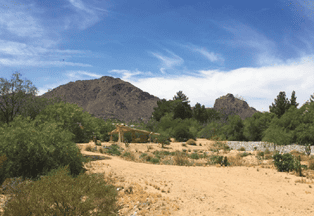Entering Lent From a Hermitage
BY MAUREEN K. DAY

I saw it first in an email I received mid-June 2020: “Blursday.” This was how a friend described our collective existence in the months following the shelter-in-place orders. The normal rhythms of our life had been disrupted and one day flowed into the next without any of the typical markers to distinguish them. Then summer came and went without the vacations and visiting we normally enjoy.
When fall picked up I knew I’d teach my graduate students from home while my “quaranteens” logged in for their first years of middle and high school. Advent and Christmas posed their own challenges. I had to sift through our traditions and see how’d I adapt them, or simply table them, and maybe get creative with new ideas.
And now I shift my gaze to Lent. When I first wondered how I would spend this Lent, a part of me balked, asking myself, “Aren’t we all perpetually in a desert?” I wondered what I could do to make Lent meaningful and not just suck me dry. The prospects were discouraging.
Then a group of colleagues and I got an email from Matt Manion of Villanova University. He began his email with, “I pray you are all staying safe and sane as we continue to live through the many opportunities 2020 has given us to lean more heavily on God.” Full. Stop.
At the Franciscan Renewal Center in Scottsdale, Arizona, thelabyrinth’s stillness beckons. This second pandemic‑Lent invites us to “lean more heavily on God.” Photo Courtesy of The Casa FRC Instagram


the Franciscan RenewalCenter in Scottsdale, Arizona, the labyrinth’s stillness beckons. This second pandemic‑Lent invites us to “lean more heavily on God.” Photo Courtesy of The Casa FRC Instagram
Matt’s email reminded me that even though life had become truly difficult if I looked at my reality in a different way, I could see the ways I had missed God’s presence and promise. For one, I could see how fragile my life was as well as our human society, and remember how utterly dependent upon God we all are. That is a gift. Second and more broadly, I was invited to see my world differently, asking myself, “What am I missing as I look at my quarantined reality?”
The theological term for interpreting reality in a new way is imagination. Scripture gives us a great example of imagination in the parable of the Good Samaritan. A Jewish man is robbed and left for dead on the side of the road.
The priest and Levite saw the victim as a source of contamination. They would not be able to perform their religious duties if they touched him, so they passed by. The Samaritan saw not a source of contamination or even an enemy (as a Samaritan might have seen a Jew), but instead saw a human being in need of help, so he showed the man mercy. Same reality, different imaginations. And wholly different imaginations lead to wholly different responses.
At one point I was quick to notice the things I’d lost in my COVID life. With a shift in imagination, I can instead make
the choice to contemplate what I might gain. Only with this shift did I remember the importance of the eremitical tradition for Franciscans. As Dutch historian Bert Roest notes, hermitages were profoundly important for Francis and in the founding of the Order. But he was caught in a tension. On the one hand, Francis felt called to active ministry. On the other, he also felt called to seclusion and prayer. Francis reconciled these by alternating between the two. And until COVID, with all the busyness of life, I had only been able to live the apostolic part of this vision. A life of ministry in the world filled my time.
Don’t get me wrong, a life of ministry in the world is great! My husband and I are productive professionals and grateful parents. Our kids participate in a variety of activities in their school, community, and parish. But as we inserted ourselves into the patterns of society, we didn’t realize that there was no place to step out of the pattern. There was no place to pause, to contemplate, to be with God in an intentional and lengthy way.
And this is also what happened to the Order. Quite early, in fact, the apostolic aspects of the Franciscan experience were elevated and the eremitical aspects were marginalized, and at times the latter were even described as a useless luxury that contributed to spiritual idleness! Despite the negative descriptions, the eremitical tradition was never completely lost.
While I remain in my hermitage, for Lent and beyond, I will think about what sort of world I want to re- emerge into. What do I want the “new normal” to look like? The Way sbfranciscans.org
Our Lord gave everything so that we might have the fullness of life. In our 2021 pandemic‑hermitage, how do we embrace that?

And, with the difficulties of COVID, we are all dwelling in a hermitage. Granted, not truly in restful contemplation, as many of us are still up to our eyeballs in meeting essential needs in person or remotely. But a lot of nonessential things have been cut from our lives. I’ve done my share of mourning. But, with a shift in imagination, I’ve also been able to approach this season (of Lent, as well as this season of our lives) with gratitude.
So, as I remain in my hermitage for an undetermined length of time, I’m planning to make the most of it. One thing I used to find myself thinking regularly was, “I cannot wait until everything goes back to normal.” When people spoke of a post-COVID “new normal” (read: masks, social distancing, and online education to avoid seasonal outbreaks), I could feel my muscles tense. There was no way I could live in that reality. I wanted the old normal!
But from my hermitage, I am remind- ed that the old normal had its problems: racism, climate injustice, threats to human life, poverty, consumerism—the list is far too long. Although I’m uncertain about the future, I have the present. While I remain in my hermitage, for Lent and beyond, I will think about what sort of world I want to re-emerge into. Using the word new in the sense of Easter newness, what do I want the “new normal” to look like? What sorts of personal and social practices will this entail? How can I support conversations and conversions in these COVID times?
This Lent, may we grow toward God in this eremitical moment, emerging with renewed imaginations. ❖
Maureen K. Day is an assistant professor of Religion and Society at the Franciscan School of Theology, and a research fellow at the Center for Applied Research in the Apostolate at Georgetown University as well as the Center for the Study of Religion and Society at the University of Notre Dame. Her new book is Catholic Activism Today (NYU Press).
Credit: The Way of St. Francis SPRING2021· VOL.26,NO.1

